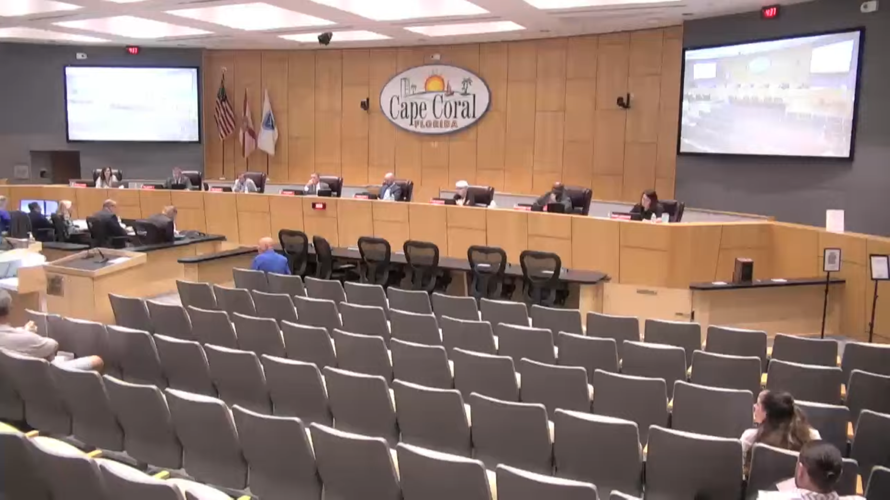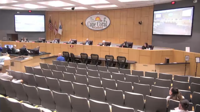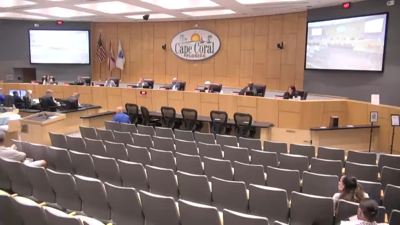Cape Coral planned to raise impact, or “mobility,” fees on developers for the first time in 19 years to help cover infrastructure costs and maintain city services. But the proposal was dropped after building industry and business leaders lobbied City Council, arguing the increase would hurt new construction, the city’s main economic driver.
“I have been lobbied tremendously, personally,” council member Bill Steinke said.
Steinke, who works for builder Aubuchon Homes and is a former president of the Royal Palm Coast Realtor Association, was one of four council members who voted Sept. 3 in favor of raising the fees.
Council was split 4-4 on whether to push forward with the updated fee schedule that imposes one-time costs on all new construction, including residential homes, gas stations, offices, churches, schools, restaurants and hotels.
The fees were honed after months of planning and public workshops. They would have been phased in from 2026 to 2029, replacing the city’s outdated road impact fees system and raising them by double digit percentages.
“This is a regressive, discriminatory tax, nothing more,” said Richard Durling, of Marvin Homes, who argued the fees discriminate against builders.
Business groups also argued the fees would be passed on to homebuyers at a time when salaries are not keeping up with the cost of construction.
“The working man and woman cannot afford to live [in Southwest Florida] anymore,” said Phillip Ford, director of the Lee Building Industry Association.
“It’s just fee after fee after fee on the real estate industry and building industry,” said Kevin Besserer, director of public policy for Royal Palm Coast Realtor Association, adding that teachers can’t afford to purchase a home on their average salary.
Steinke argued the new fees would have a much smaller impact on homebuyers than Besserer and Ford suggested. That’s because even though the proposed increase is a high percentage of current fees, it’s a small percentage of what a homebuyer would pay for a home — adding 1.7% to that cost by 2029 even if prices stayed the same as they are now.

Cape Coral City Council member Bill Steinke speaks during the Sept. 3 meeting, where Council split 4-4 on raising impact, or “mobility,” fees on developers. Steinke voted in favor of the increase.
He suggested that the city needs to raise prices for the cost of infrastructure just as builders raise costs when prices for raw materials go up.
“No one came to the podium and said, ‘builders, you can’t charge that much for a home,’” Steinke said. “… If that mobility fee is put in place, the actual affordability of a home does not go up by multiple digit percentages.”
Council member Keith Long took issue with builders complaining that “working men and women” can’t afford homes.
“They’re not here to advocate for the working class,” Long said. “They’re here to advocate for their pocketbooks. I’m not going to sit here and be scapegoated by these individuals who played a significant role in these issues that we face.”
Steinke and Long, along with council members Joe Kilraine and Derrick Donnell voted for the increase, which would have provided an estimated $500 million of $2 billion that planners estimate the city needs for current and future projects.
Several speakers said they would support a smaller increase, asking Council to consider an alternative plan: a fee increase of 12.5% per year instead of more than twice that amount.
Council members Rachel Kaduk, Jennifer Nelson-Lastra, Laurie Lehmann and Mayor John Gunter voted against the larger increase but also indicated that they are willing to consider the smaller 12.5% per year increase in the future.
The Sept. 3 vote was unusual because legally Cape Coral had a limited window of opportunity to raise fees by the larger amount that the city’s planners said was needed under “extraordinary circumstances.” A study by urban planning firm Nue Urban Concepts mapped out transportation planning in the Cape over more than 20 years as the city expands toward full buildout.
“It’s not a wish list,” said Bill Corbett, the Cape’s assistant public works director and chief engineer, at a workshop in July. “It’s a needs-based plan.”
But the Cape may have lost the chance to consider the larger increase. Under state rules, they needed at least two-thirds of Council to vote yes on the larger increase by or before Oct. 1 to make it happen.
After that, rules require all eight of them to vote yes for a larger increase, Gunter explained. But Council can still raise the “mobility” fees anytime under normal voting rules by up to 12.5% per year for up to four years at a time.
“For me, at this point, I haven’t seen or outlined exactly what those extraordinary circumstances are for me to move forward above the 12.5%,” Gunter said.






(0) comments
Welcome to the discussion.
Log In
Keep it Clean. Please avoid obscene, vulgar, lewd, racist or sexually-oriented language.
PLEASE TURN OFF YOUR CAPS LOCK.
Don't Threaten. Threats of harming another person will not be tolerated.
Be Truthful. Don't knowingly lie about anyone or anything.
Be Nice. No racism, sexism or any sort of -ism that is degrading to another person.
Be Proactive. Use the 'Report' link on each comment to let us know of abusive posts.
Share with Us. We'd love to hear eyewitness accounts, the history behind an article.